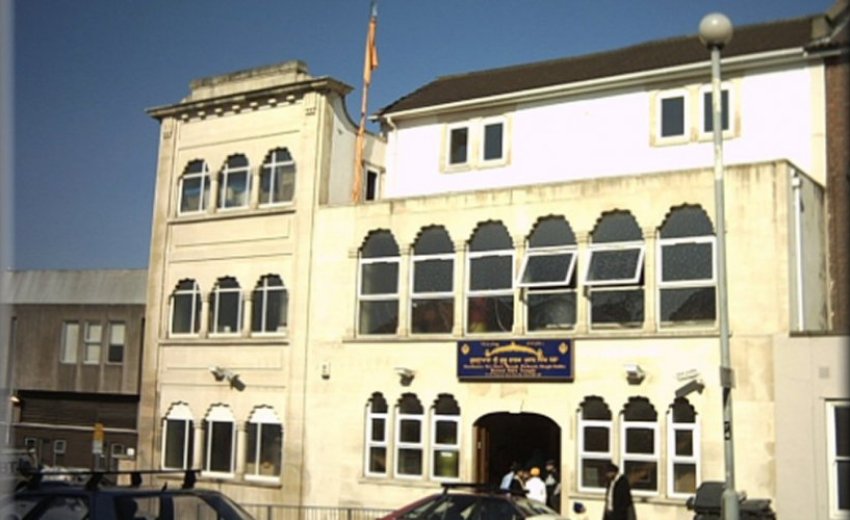Unlike many other religious faiths, Sikhism preaches and promotes equal rights for women. The subordination of women, the practice of using the father or husband’s last name, as well as following rituals that showcase dependence on men, are all alien to Sikh principles.
Come join with me, my sisters,
And sing songs of joy and delight.
My true friends have arrived in my home!
-Guru Nanak, Guru Granth Sahib, p.764
However, in the last 400 years, most of the Sikh institutions were run by men. Walayati Singh Chauhan, who was the President of the Bristol Gurudwara in 2008, said that it is elderly men in the West often prioritize their concerns and politics related to India.
Historic reform; Women gaining equal rights
On October 14, 2007, the management committee of the Sikh temple located at Fishponds Road in Bristol, U.K., held a vote on women's suffrage. The result was seven in favour and one against, with the lone opposing vote cast by Mohinderjit Singh Bhatti, who was the General Secretary at that time.
However, in the weeks and months that followed, there was no official announcement regarding this historic reform made to the Sikh congregation. In response to this lack of communication, several Sikh women met with the President of the Gurdwara, Walayti Singh Chauhan. He acknowledged the need for the decision to be shared with the Sikh community and agreed to issue a letter confirming and announcing the outcome.
A women’s rights activist in her 60’s, Gurdip Kaur shared her views saying, “ Walayti Singh took the brave step and put the committee's agreement of October 2007 onto paper, knowing that he may face resentment. He is responsible for ensuring that the basic tenets of Sikhi (Sikhism) were enforced; to treat all humankind as equals. He stood up for what is right.”
Sikh women in Bristol have been advocating for their voting rights in gurdwara elections for several decades. Gurdip Kaur stated that there have been over seventy-five letters sent to gurdwara committees in the past twenty-five years, urging for complete equality for Sikh women. Unfortunately, all of these letters have been ignored.
Instances of inequality
President Walayti Singh expressed support for the women's plans to celebrate their success at an upcoming event. They reached out to six female Sikh speakers and also invited notable non-Sikh figures such as Dave Chapple, the national chair of the U.K. National Shop Stewards Network.
However, General Secretary Mohinderjit Singh Bhatti disagreed and restricted the number of women speakers to just two. He also refused to approve any non-Sikh speakers.
In order to comply with the general secretary's wishes, the president and the women activists made the necessary adjustments. As a result, only two Sikh women spoke at the event on May 4 in 2008 and the outside speakers were cancelled. Despite this setback, the activists recognized the significance of Sikh women gaining the right to vote.
Outrageous suppression of women
After the women delivered their speeches, General Secretary Mohinderjit Singh Bhatti took the stage and strongly voiced his opposition to women's suffrage. He failed to acknowledge that the management committee had already given their approval for the reform.
General Secretary Mohinderjit Singh tried to persuade the congregation to reverse women's victory, Gurudip Kaur asked President Walayti Singh to speak, but General Secretary forcefully took the microphone, causing a ten-minute uproar.
Javinder Singh, who was on the verge of being elected as the new general secretary of the committee, expressed his astonishment at witnessing an insult directed towards an elderly woman. He described the act as completely deplorable and extremely saddening.
Repercussions of the insulting incident
In response to the incident, President Walayti Singh Chauhan took action by suspending Mohinderjit Singh Bhatti from his position as general secretary. The President requested Bhatti to return the gurdwara documents he possessed until a thorough investigation of the incident could be conducted. The gurdwara election, initially planned for May 11, 2008, was postponed to allow women members sufficient time to register for voting and to calm the situation.
Mohinderjit Singh Bhatti refused to return gurdwara documents despite multiple requests, leading President Walayti Singh to seek legal action for their retrieval. The documents contained meeting minutes and decision records.
As a result of his actions, Mohinderjit Singh Bhatti stopped attending gurdwara services. This decision also influenced the vice president and vice treasurer of the committee to follow suit. Initially, all three of them had voted in favour of women's suffrage back in October 2007. Surprisingly, Bhatti also gained the support of three out of the eight members of the gurdwara's management committee.
Mediation between pro and anti-suffrage
In an attempt to expedite the election process before women could register, Mohinderjit Singh's group approached the Bristol police. They explained that the term of the gurdwara president, Walayti Singh, had already ended, and they believed he had no authority to delay the election. The police agreed to mediate the dispute, selecting five representatives from each side. Mohinderjit Singh Bhatti's group consisted of older men, all born in Punjab, while the women's suffrage group encompassed a diverse range of ages, including both sexes, with four individuals born in the U.K. and one in India. They had a single meeting with the police.
Over a period of two weeks, with a few extra days' extension, Sikh women completed their registration. By the end of this period, 170 Sikh women were eligible to vote. With the establishment of suffrage, three women—Narinder Kaur, Anita Kaur, and Sheila Kaur—decided to run for management committee positions. They joined the pro-suffrage team, alongside Walayti Singh Chauhan, who sought another term as gurdwara president.
On the day of the election, Sikh voters would cast only one vote, choosing between the two management committee teams. Although Mohinderjit Singh Bhatti was not listed on the ballot, his brother ran for the position of general secretary. Conversely, Walayti Singh's team presented the Sikh community with a groundbreaking new committee that included both men and women of all ages.
The pro-women's-suffrage slate consisted of Walayti Singh Chauhan (president), Shamsher Singh Patel (vice president), Javinder Singh (general secretary), Satchet Singh (vice general secretary), Kuldip Singh (treasurer), Narindar Kaur (vice treasurer), Anita Kaur (langar jathedar), and Sheila Kaur (vice langar jathedar).
On the other hand, the anti-women's-suffrage slate was comprised Raghir Singh Nirman (president), Baldev Singh (vice president), Mohanjit Singh Bhatti (general secretary), Jaswant Singh (vice general secretary), Mohan Singh (treasurer), Satnam Singh Amritsaria (vice treasurer), Harpal Singh (langar jathedar), and Raju Singh (vice langar jathedar).
Mohinderjit Singh's group hired an attorney but was denied their request for legal representation during negotiations. They decided to boycott meetings. Instead, they notified the police that the election would take place on July 6, 2008. Furthermore, they mentioned that they were in the process of hiring a private security firm to ensure peace on election day.
However, Bhatti's team failed to adequately inform the Sikh congregation about the election. Consequently, many Sikhs who attended worship on that Sunday were unaware that it was actually election day.
Fearing a violent outbreak, the Bristol police stepped in and dismissed the hired security guards. They insisted on implementing proper voting procedures before the election could proceed. In order to address the situation, they requested two representatives from each side to meet with them immediately. Over the next few weeks, both parties engaged in successful negotiations to iron out the details of the upcoming election and eventually signed a contract.
Mohinderjit Singh Bhatti's group received a request from the police to stop sending letters to the sangat (community), as it was causing confusion among the members. They reached an agreement to involve an independent voting company. The Association of Electoral Administrators was chosen to conduct the election. The registration for voting was extended once again to accommodate traditionally-minded Sikh women who did not believe in their right to vote, allowing them to register. The voting company insisted that registration be completed one week prior to the election and that the final voting list be considered as the definitive one.
Over the next two weeks, Sikh women were encouraged to register for voting. On the last day, the registration period was extended for a few hours to accommodate latecomers who were waiting in line to complete their registration.
However, on July 27, 2008, two days after registration had officially closed and the voting list had been finalized, Mohinderjit Singh Bhatti's team claimed that they had seventy-nine more women to register. The voting company refused their request, citing the existing contracts in place.
The Election Day
On Sunday morning, August 3, 2008, a large number of Sikhs from both factions gathered at the gurdwara at 8 A.M. The voting was scheduled to commence at 10 A.M., and tensions were running high. Among the attendees were seventy-nine Sikh women who had missed the registration deadline. They were furious about being denied their right to vote and made their discontent known. The police arrived and blocked off the street, while the media also descended upon the scene. One Sikh man was initially arrested but was later released. In a show of protest, some of the seventy-nine women and their supporters surrounded the car belonging to the manager of the voting company.
Javinder Singh, in his report, conveyed that "The Association of Electoral Administrators displayed great patience throughout the negotiation process leading up to the elections. They were understanding, firm, and fair in their approach throughout the entire election process. They ensured that the elections were conducted independently and professionally."
Fifteen minutes before the scheduled start of the election, the police called for a meeting involving both factions, resulting in a two-hour delay. The pro-women's suffrage group proposed allowing 80% of the unregistered women to register, and the voting company agreed to this arrangement. However, this offer was angrily rejected, leading Mohinderjit Singh and his supporters to boycott the election.
Despite the delay, the election eventually proceeded. The pre-women's suffrage team secured an overwhelming 93% of the votes, while Mohinderjit Singh Bhatti's side received only 4%. It appeared that even if the anti-woman's suffrage group had voted, including all seventy-nine late-registering Sikh women, Mohinderjit Singh Bhatti's side would still have faced defeat.
The re-elected President Walayti Singh Chauhan said, “We commend the Avon & Somerset police for their understanding of the situation that we found ourselves in. It was a great job done. They were sensitive and respectful of the Sikh principles at all times.”
Javinder Singh, the new general secretary added, 'When the women bowed to our holy Sikh scripture (Guru Granth Sahib), our Guruji, to accept their official duties, they glowed with a happiness and joy that seemed almost transcendent to me. I realized I had never seen that look on the faces of those Sikh women before and that made me determined to keep fighting for the rights of Sikh sisters and women everywhere.'
*Based on an article by Kamalla Rose Kaur, published in The Sikh Times on 31st August 2008

